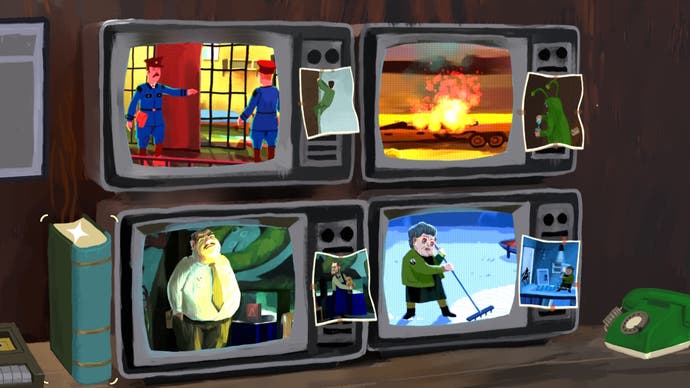The Rise of the Golden Idol review - the best detective game since Obra Dinn makes a killer return
Point-blank brilliant.
After playing as an eighteenth-century detective to solve 12 terrible murders in Color Gray Games' sensational debut, The Case of the Golden Idol, the decision to suddenly jump the story forward 300 years for this near-contemporary sequel came as something of a surprise. Not only did there seem to be unfinished business ripe for further unravelling at the end of Case's conspiracy caper, but its detailed pixel art and gurning cast of grotesques also felt so of a piece with its historical set dressing that I wondered whether its freeze-frame tableaus would have quite the same effect at such a far remove from their stylistic beginnings.
Happily, the paranoia and political jostling of the 1970s couldn't be a more perfect backdrop for the nefarious deeds sitting at the heart at The Rise of the Golden Idol, whose conflicts and ideological power struggles are staged across an even wider variety of scenarios this time round, but always with the same keen eye for chaos and collusion that defined its brilliant predecessor. To say very much of anything about its wider story would be to spoil many of its twists and surprises that are best left discovered for yourself. But as we're taken from zen gardens and drive-in cinemas to TV auction shows and corporate board rooms, the scale and ambition of this rip-roaring tale is clear - and it doesn't always need a gruesome murder to spur you on to see where it's heading next.
Indeed, while the number of actual deaths left me feeling a little short-changed to begin with, The Rise of the Golden Idol proves there's just as much drama and satisfying detective work to be found in getting to the bottom of petty squabbles, prison breaks, community picnics, and in one particularly memorable sequence, a completely violence-free dance routine, to name just a few of the scenarios you'll be pointing and clicking through over the course of its 12- to 13-hour runtime. As a quick recap for those who haven't played The Case of the Golden Idol (which you don't need to have played to enjoy this one fully), each scene invites you to explore a single moment in time, either during or in the immediate aftermath of a particular crime. With perps, victims, witnesses and bystanders all frozen in horrified disarray, it's up to you to rifle through the pockets, bins and possessions in front of you to work out what happened and why, as each diorama adds further new wrinkles to its ongoing story.
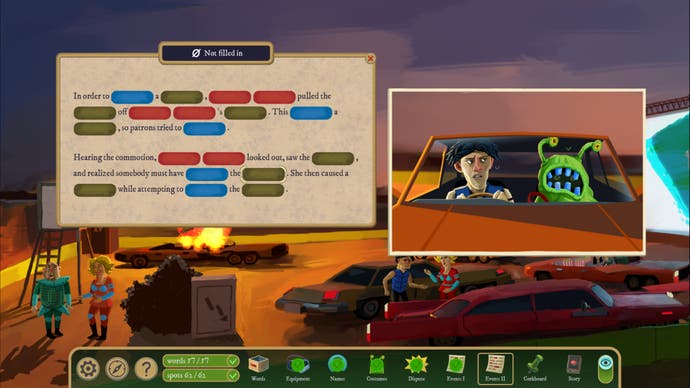
It's a setup that remains as enticing as ever, and just like Case, its best moments hark back to the rank-and-file discoveries of Lucas Pope's nautical masterpiece, The Return of the Obra Dinn. I'm still not sure Rise surpasses Obra Dinn in that department, mind, but the process of discovering its pertinent facts is one that now feels even livelier thanks to Rise's more modern, painterly visuals and freer-flowing animation loops. Here, exaggerated eyerolls, gnashing lips and wild, arching limbs all converge to create zoomed in close-ups that feel just as characterful as Case's pixellated portraits, and for scenarios where there isn't a scene-stealing murder hogging all the attention, each scene's larger-than-life compositions often work just as hard to hook you in right from the off. Whether it's through their use of brighter, more vivid colours, contrasting light sources or artfully arranged cast, some of these scenes could almost pass as deranged cousins of American Realist paintings such as Edward Hopper's Nighthawks.
These scenes aren't just captivating to look at, however, as they're also packed with tiny, incidental details that you'll analyse and internalise to make sense of the chaos before you. Rise makes a number of new concessions here, flagging up more clearly which 'spots' still need more thorough investigation, while also gathering all the relevant names, verbs and nouns you'll need to solve each scene's respective puzzle boards automatically whenever you click on important objects and characters. The former is a welcome improvement, drastically reducing that back-and-forth search for those final clues you need to complete a scene, but I do feel the latter is perhaps a step too far the other way. I quite enjoyed the manual word-gathering process in Case, but here it's all handed to you on a plate, robbing you of some vital detective work in the process.
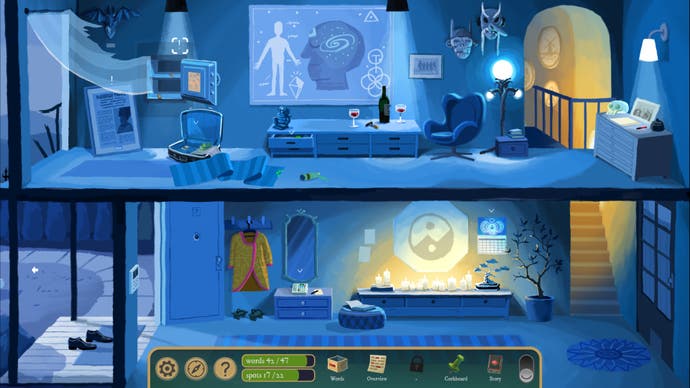
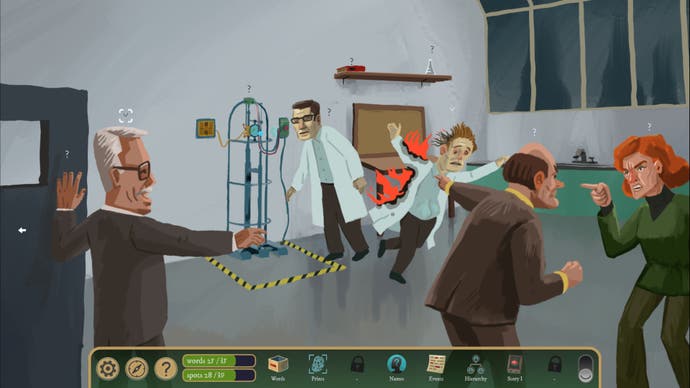
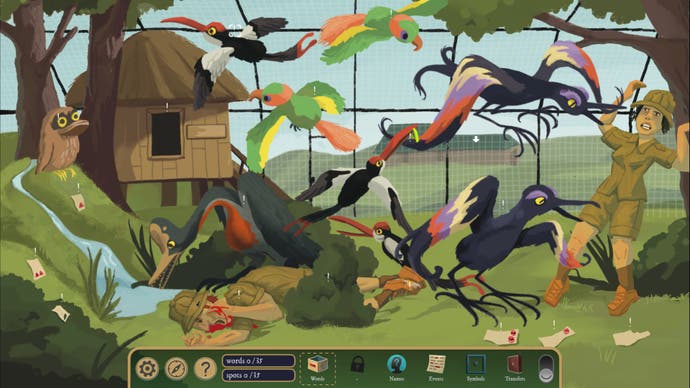
That said, there is a lot more information to parse here than there was in Case, and as scenarios began to grow in complexity, I did come to appreciate the overall slickness of Rise's evidence gathering. That's mostly because there's still a heck of a lot for you to work out by yourself in these scenes, and the words themselves are really just the tip of the iceberg here. The real detective work comes from sloshing all those facts around in your head, and if it's not keeping track of wallet and chequebook amounts when the lights go out during a two-part auction murder, then it's piecing together torn pages of a birdkeeper's manual or naming the residents of two, four-storey apartment complexes based on nothing but scraps of dialogue, personal effects and some good old-fashioned logic.
Case had these sorts of incidental puzzles, too, of course, but they were always presented more like fun optional extras as opposed to being the main event - which was always filling in the blanks of the main murder scroll to work out whodunnit, why and how. Here, though, they're more tightly woven into the overall fabric of the mystery at hand, often demanding that they're solved first before you're even granted access to the main 'story' panels. The mysteries themselves feel fuller and more densely plotted as a result, even when scenes feel quite throwaway in nature, or seemingly unrelated to what's come before it. They all tie together eventually, and the way Rise juggles so many threads without dropping the ball at all when it comes to building suspense is a testament to Color Gray Games' deft and intricate storytelling.

It's a process that's helped immensely by its new end-of-chapter puzzle panels, which must be solved before you can proceed to the next chunk of the story. Not only do they link each chapter's handful of scenarios together, but they also act as important tests of your overall knowledge so far, making sure you fully understand the significance of what you've just played before you're allowed to move on. It doesn't always get the balance right, admittedly - while some felt like important mental connections had been made in the solving of them, others felt like I was just retreading the same old ground I'd solved literal minutes ago. Mostly, though, these panels - together with the extra items that appear on each chapter's scene select screen - form important bookends to Rise' ongoing mystery, and you'll need to pay careful attention to every single one of them when it comes to solving the very final sequence of Rise's superb climax.
All that said, there are a few remaining bumps that could do with a little more sanding down, I reckon. Dates, for example, play an increasingly important role in Rise's later segments, and while most of the game takes place sequentially, some scenarios are still presented out of order, leading to some easily confused lines of enquiry if you're not paying extremely close attention to the month or year. It's one of the few pieces of information that isn't easily summarised or gathered up somewhere later for easy reference, leading to some rather laborious scene-hopping when it comes to double-checking your facts (though the fact you can easily navigate to different scenarios at all is another very welcome addition).
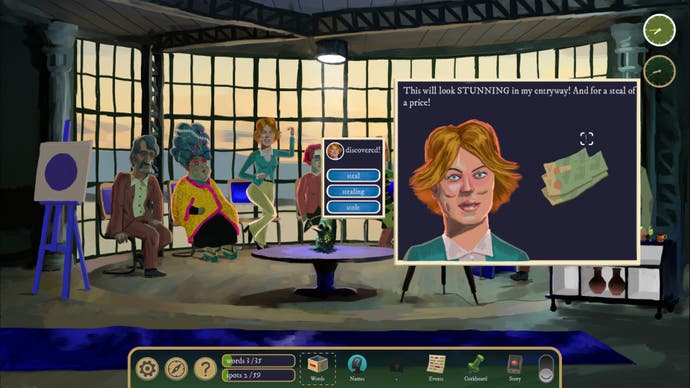

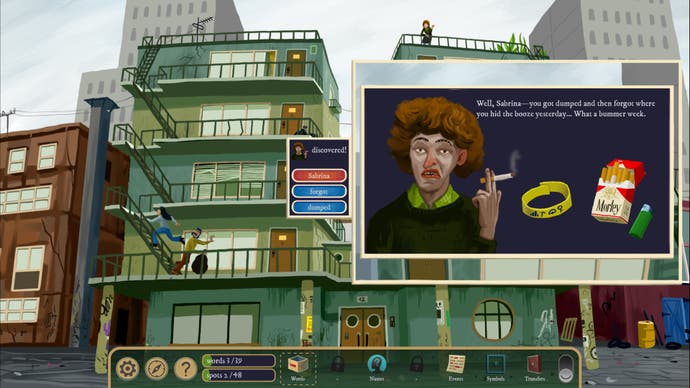
Its word-based solutions also remain a little too susceptible to brute-forcing an answer, as every blank is still colour-coded to its respective word type. Red blanks, for example, are always names, while blue blanks are always verbs, and so on. On the one hand, I'm not sure making them all the same colour would necessarily help matters, as you're often dealing with too many words at once to make that kind of approach feasible, and I think I'd just feel even more at sea if I didn't have that initial colour-coded foothold.
On the other, the surrounding sentence structure can still be too much of a giveaway within those defined pools of words sometimes. Tenses for some words might not match, for instance, or the presence/lack of an article or preposition will narrow your choices down further, allowing you to effectively guess several correct answers by process of elimination rather than proper logical reasoning based solely on the facts of the case. It's a problem that Case struggled with as well, in fairness, and I can only imagine the linguistic juggling that has to occur in making sure these scenarios work not just in Color Gray Games' native Lativian, but also in English and the other 11 languages available in Rise's settings menu. But until it manages to clamp down on this kind of looser fudging of the facts, it will always remain one step behind Return of the Obra Dinn for me, which remains the unbeaten master of the blank-filing detective niche.
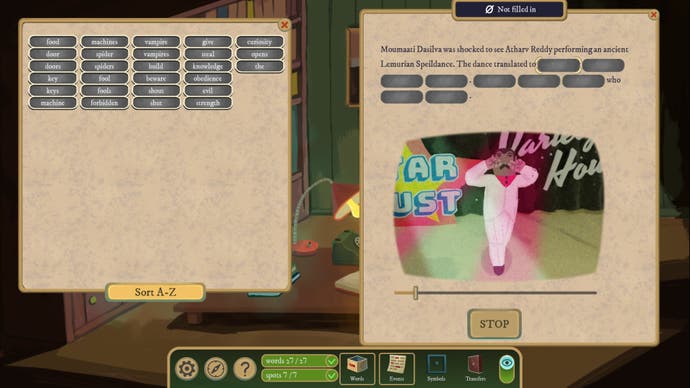
(Though there was one rather important place in my pre-release version of the game where I'm sure there almost certainly was an error, regarding a missing article, which dramatically changed the meaning of the accompanying sentence. I'd hope this would be fixed by the time Rise launches, but consider yourself warned/absolved if you get stumped by it as well).
Still, even in the face of these admittedly small pitfalls, I cannot deny the wider accomplishments of The Rise of the Golden Idol nearly everywhere else. This is a brilliantly plotted thriller story stuffed with an enormous cast of memorable scoundrels, buffoons and quietly tragic onlookers, and it's all backed up by wonderfully devised puzzles that really give your brain a good runaround before you're able to prise open its hard-won secrets. It's everything you could hope for in a Golden Idol sequel and more, and with the news that even more of it's on the way next year, I simply cannot wait to see where Color Gray Games takes us next in this marvellous mystery series.
A copy of The Rise of the Golden Idol was provided for review by publisher Playstack.
